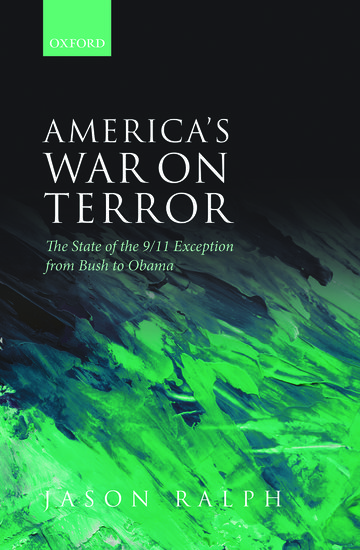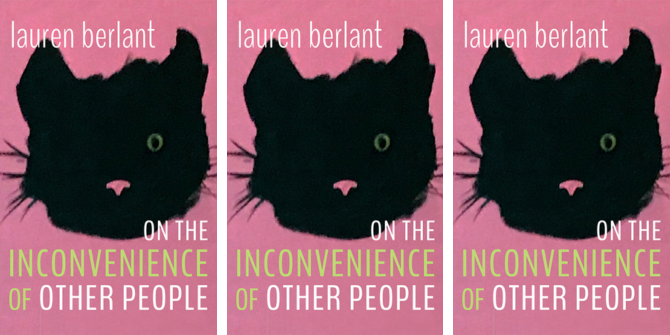Twelve years on from 9/11, students across the social sciences continue to study the impact of the terrorist attacks on foreign policy, public attitudes to race and religion, and the fallout from the War on Terror. These recommended reads on the subject from USApp’s sister blog, LSE Review of Books, cover issues of immigration and detention, US foreign policy, conflict in Afghanistan and Iraq, and architecture and planning at Ground Zero.
…………………………………………………………………………………………………………………
America’s War on Terror: The State of the 9/11 Exception from Bush to Obama by Jason Ralph
Following 9/11 the United States faced a situation of exceptional insecurity. In that period the Bush administration argued that certain international norms did not apply to US conduct. More than a decade on from 9/11, and following a change of administration, this book aims to examine the influence this approach has had on American policy. America’s War on Terror is an impressive interdisciplinary work which uniquely brings together an analysis of a well-worn topic from the lens of both international law and international political theory finds Liane Hartnett. Read more…
…………………………………………………………………………………………………………………
Battle for Ground Zero: Inside the Political Struggle to Rebuild the World Trade Center by Elizabeth Greenspan
After 9/11 came the question of what to do with Ground Zero. This book aims to go behind the scenes of the fight to rebuild, revealing how grieving families, commercial interests, and politicking bureaucrats clashed at every step of the way, confounding progress and infuriating the public. Nathan Bullock praises Elizabeth Greenspan’s book for giving a voice to the people involved in all aspects of planning and building. Greenspan’s emphasis on public involvement in architecture and urban planning will allow for all citizens to be better involved in future redevelopment projects. Read more…
…………………………………………………………………………………………………………………
Canada/US and Other Unfriendly Relations Before and After 9/11 by Patricia Molloy
Canada/US and Other Unfriendly Relations examines relations between the two neighbours, and considers Canadian political and cultural identity before and after 9/11, giving a close analysis of how myths of Canadian benevolence are circulated in the media. What emerges is a story of a conflicted and stormy relationship between two countries, who are seen to both rival and envy each other. Donald Abelson argues that this thoughtful and carefully reasoned critique of the “darker side” of Canada-US relations offers a unique foray into a discussion that rarely takes place in the public arena. Read more…
…………………………………………………………………………………………………………………
9/11 Ten Years After: Perspectives and Problems by Rachel E. Utley
Ten years on, what have been the principal impacts of the terrorist attacks of 9/11 on the external policies and international outlooks of the world’s major powers? This book investigates a range of international responses to the events of 9/11, to evaluate their consistency over time; to analyse their long-term significance and to consider both their implications for the international security agenda and the prospects for international cooperation in addressing the challenges posed. Jude Howell believes the breadth of the book will ensure that it provides a useful source for researchers and students in the fields of security studies and international relations. Read more…
…………………………………………………………………………………………………………………
Detained Without Cause: Muslims’ Stories of Detention and Deportation in America after 9/11 by Irum Shiekh
Detained Without Cause is a collection of oral history accounts by six New York based Muslim immigrants who were incarcerated following 9/11. None of these men had any connection to terrorism, and yet as their stories reveal, they were presumed guilty by the arresting officers, the FBI, the court system, the media and their communities. They were held without trial for several years in solitary confinement, in maximum security facilities where their human rights were systematically violated before being deported on trumped up immigration charges. Rory Creedon finds an important book with policy implications relevant far beyond the borders of the US. Read more…
…………………………………………………………………………………………………………………
Counter-Terrorism, Aid and Civil Society: Before and After the War on Terror by Jude Howell and Jeremy Lind
Counter-Terrorism, Aid and Civil Society critically examines the effects of the War on Terror on the relationships between civil society, security and aid, drawing on original fieldwork in Afghanistan, India and Kenya. Volha Piotukh finds that the book makes a valuable and significant contribution to debates on the wars on terrorism and their impact, and on the securitisation of aid and development. The book’s logical structure, clear and engaging writing, wide-ranging sources and impressive level of detail mean that it will appeal to a variety of audiences, from scholars to policy-makers, from students to NGO workers. Read more…
…………………………………………………………………………………………………………………
Terrorism: A Philosophical Enquiry by Anne Schwenkenbecher
Anne Schwenkenbecher examines the most urgent philosophical questions pertaining to the problem of terrorism: What is terrorism, or, how should it be defined? And could terrorism ever be justified? The book questions well established frameworks and widely held convictions: it denies that terrorism is always wrong and morally worse than war. It invites the reader to approach these matters from a new perspective, according to which terrorism is just one of many forms of political violence. Jacob Phillips finds that the book offers genuinely informative insights into the gulf between a proper philosophical understanding of the word terrorism and its popular usage. Read more…
…………………………………………………………………………………………………………………
Please read our comments policy before commenting.
Note: This article gives the views of the author, and not the position of USApp– American Politics and Policy, nor of the London School of Economics.
Shortened URL for this post: http://bit.ly/13L0NYu












